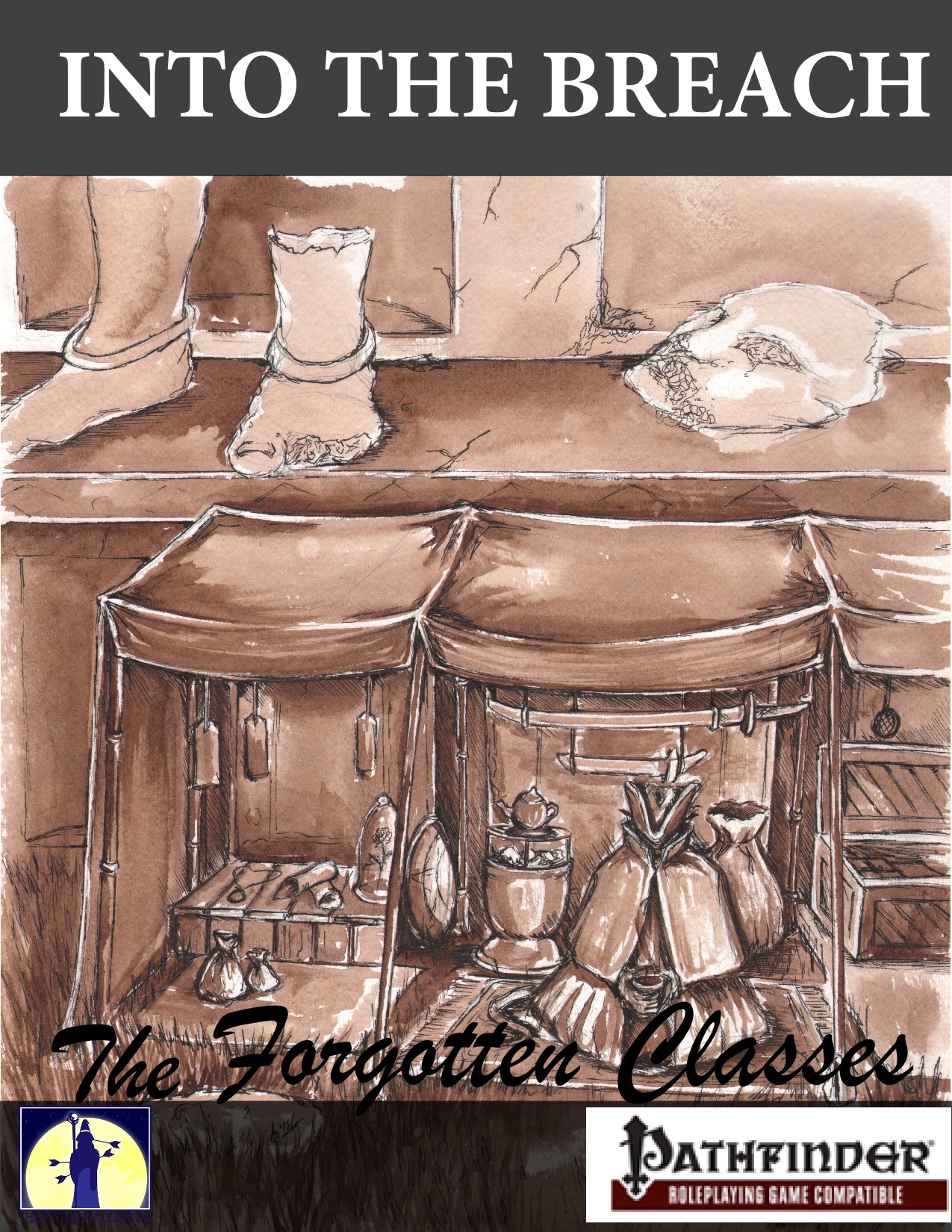Monday, January 11, 2016
Review: Into the Breach: The Forgotten Classes
The subject matter in this one appeals to me a lot. This entry into the Into the Breach series from Flying Pincushion is a bit different from the rest. It is about NPC classes, something that I feel is underused throughout the game. NPC classes represent an easy way to generate some stat blocks to do a purpose and become thrown away because honestly NPCs will either die too quickly or their stats rarely come up enough to warrant going through the process of building them as a complex base class. Its too much work for their lifespan so anything that helps on that front is very welcome. Also they represent some GM only territory to help smooth things along, present unique challenges and make a character unique. So lets take a look at what Flying Pincushion does with them.
Starting with the Adept the first archetype grants more complex class features than what I'd care for on an NPC. Basically it can summon incrementally stronger construct out of a chosen elements. You're basically making two NPCs at that point but once they're statted out they aren't too complex. I do feel like just conjuring elemental from existing bestiary stat blocks would have been simpler so points off for that but those points come back because you can actually make an interesting encounter with this archetype. One thing that has to be said is that this archetype is way too powerful for the abilities it replaces, but I'm not counting this against it. Mainly because this is GM only territory so that kind of stuff doesn't matter. I don't even think that the summon construct thing even has a per day limit which is overpowered in the hands of a PC but with an NPC it is allowed to have these kinds of things.
The next Adept archetype is a cannibal that gets benefits from eating hearts and brains. It's simple and concise and is probably the best example of things that I want to do as a GM that I don't want players doing, or at least not with that specific ability. Its the kind of unlimited overpowered thing that is hidden behind an inept class so that players don't do it. After that is the Nun which is a support cure-y Adept, and a Vicor, a more Inquisitor-ish Adept that is way more varied based on it's domains. It also get some extra abilities based on what domains it has. The Aristocrat gets archetypes making it a nature cultist, junkie or tax collector. About the only one that I feel is less interesting is the first one but the other two have something about them that make them interesting to interact with or fight. The Commoner gets a woodsman archetype, an animal handler and a bum. The expert gets a locksmith, a crafter and a minstrel. The Warrior gets a savage, a peasant, a siege engineer, and an archer.
Following the archetypes is a new Alternate Class that is basically a merchant. I don't know what it's an alternate class for but it fills it's role basically enough as a new NPC class.
After that is an entire slew of new mundane items including weapons and armor which is basically inferior to normal weapons and armor and would be used by peasants and savages.
As a whole although only one archetype really became complex handling NPC classes via archetypes is more complex that I would liked. The archetypes themselves make the NPCs more powerful, which is okay with them as a GM tool but one thing that is actually sad about it though is that having them as hirelings or cohorts in the control of the player is a bad idea for some of these. This does not apply to all of them but they do basically make the balance different so they cant' be handed over without some forethought. I am also disappointed that NPC boons were not covered at all as that is design space for NPCs that rarely gets explored. That said The archetypes are more about flavor than anything else and certainly add abilities that increase their flavor and can make interesting fights or interactions with player characters. They are interesting and I will certainly use them when their concepts come up, I'm just not jumping up and down over what they bring to the table. Another bit of criticism is that there are typos here an there. They don't really ruin rules or anything and I'm overall dismissive of them because of the GM-centric nature of the product. Bottom line is that this gets 4 out of five stars from me.
You can find this over on Paizo.com here.
Labels:
3pp review,
4 star review,
pathfinder
Subscribe to:
Post Comments (Atom)

No comments:
Post a Comment